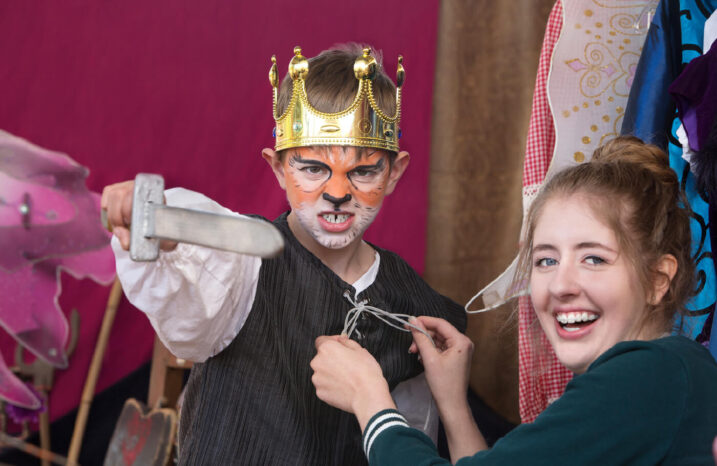What is Scripted or Echoed Language in Childhood?
Scripted or echoed language in childhood is the tendency to copy phrases out of movies or videos. For example, your child may have a favorite YouTuber who your child incessantly quotes.
Children with scripted language tend to take these phrases out of context. It feels like this joke is on repeat. As the listener, you start asking yourself, “why is that so funny?” The child may feel they simply have to repeat the phrases to you and you merely have to listen.
Michelle Garcia Winner, a recognized social skills expert, and trainer came up with a character to represent how ‘unfunny’ it is to keep retelling the same joke. She named her character ‘Was Funny Once.”
Here’s a quote from a song that goes along with this character,
“Was funny once. Less funny twice. Not funny three times. Take my advice. It was funny before. And now it’s a bore. Was funny once. But not anymore.” [1,2]
Symptoms of Scripted or Echoed Language in Children
Echoes a common line or phrase of a movie: your child runs around the house saying the same thing over and over, like, “To infinity and beyond!”
Here, the listener may find that the child’s phrasing becomes obsessive. In toddlers, this behavior is normal. Repetitive language is unusual once a child is four or five years old.
A pretend video on repeat: your child may pretend to be a favorite YouTuber. They may insist on doing the whole show in the voice and style of the character in the videos.
Here, the child is getting a little too obsessed with these videos and is drifting off into fantasy land rather than being here in the real world with the rest of us.
Uses a unique word with frequency: your child may say “well, usually” over and over in conversation. For example, “Well, usually, we watch this show,” or “Yes, I usually like to see friends at school,”
Here, the child uses a word like ‘usually’ to serve as a filler to embellish sentences or statements.
Brings made-up words into the conversation: your child may often use a made-up word without giving the context. For example, “It was a total tree-wreck yesterday.”
Here, the listener must clarify what the child’s phrase means. The child has made up the phrase and is expecting peers or adults to make sense of it on their own.
Repeats a word when excited: your child often repeats a word or phrase to express excitement. For example, “wowie, wowie, wowie!”
Here, you notice that repeated word is the only way the child can think to express a specific emotion.
Repeated language sounds formal: your child repeats something unusually sophisticated for the child’s age. The child may start several statements with a term like “generally speaking.”
Here, the repeated phrase is appropriate to the dialogue, but it is unusual in that it seems too mature for the child’s age.
Echolalia: your child is repeating sounds and words that they hear someone else say like an echo. For example, “Class, it is time to sit down for storytime.”
Here, the child just says back what the teacher said, rather than spontaneously sharing their own thoughts or ideas.
Pronoun reversals: your child may say what he wants but use the wrong pronoun. For example, “you want a cookie.”
Here, the child is having trouble asking for what they want and is repeating what they have heard adults say instead.
Causes of Scripted Language in Childhood
Autism spectrum disorder: a diagnosis of ASD includes social communication challenges and restricted or repetitive behaviors (RRB). Repetitive, scripted, or echoed language is a common symptom of ASD. The reason kids with ASD repeat phrases is because they are unsure how to contribute to conversations. When diagnosing autism, psychologists look for repetitive, scripted, or echoed language. [3] Want to know if your child’s challenges are a sign of Autism Spectrum Disorder? Cadey courses are taught by licensed psychologists and walk you through the symptoms of autism and how they may present in your child. Sign up today.
Language disorder: a diagnosis of expressive language disorder includes difficulty with fluent expression and communication. A child who has trouble expressing themselves or has a stuttering or fluency disorder may repeat themselves or rely on parroting words heard from adults or movies. These issues are much different from the ASD profile mentioned above because social difficulties are not the reason for the repeated words.
Intellectual disability: a diagnosis of an intellectual disability may include some trouble with communication because of verbal comprehension and processing speed challenges. When it is hard to understand and process language, sometimes children are more likely to repeat themselves or get stuck on certain words or phrases.
What to Do About Scripted Language in Childhood
To improve language and decrease your child’s tendency to repeat a phrase over and over, a parent can take these five essential steps.
- First, use and model language for your child. Encourage back and forth conversation on a variety of topics. Practice asking questions, answering questions, and sharing information back and forth. Vary activities and conversation topics at home. If your child likes a certain YouTuber or movie, require that they start the conversation with that. For example, “I like this YouTuber and I would like to tell you about him. Are you interested?” After you say, “Yeah, sure, ” your child can quote the character.
- Second, try the ‘do you mind’ strategy. Help your child understand that not all of their interests are shared by others. If they want to tell a whole set of lines from a movie, require your child to say something like, “That’s the first part. Do you mind if I go on?” In this way, you teach your child to pay attention to their conversation partner’s interests. Jed Baker describes this grand strategy and many others in his books and instructional videos. [4,5]
- Third, get your child enrolled in social activities with low ‘social risk.’ Certain social activities do not require a lot of social skills or specific talents for participation. For example, try a Lego club, cooking class, robotics club, and swimming at the local pool. Find something that has team aspects but is not as competitive as a typical sport. Start with an activity with some structure but is about individual performance, such as a tumbling class or a painting class at the rec center. Practice what to talk about during these activities.
- Fourth, consider a social skills group. This may be facilitated by clinicians who are trained to help children develop conversation skills and engage in back and forth conversation and social interaction like playing games, talking about different topics, or working together to solve problems or puzzles.
- Fifth, provide breaks and downtime. Give your child time to talk about their favorite interests, including movies and YouTubers. Every child needs some time on their own, and that is okay. Provide a space for your child to talk about topics they like. For example, if your child wants to do a whole youtube video presentation with you as the audience, take some time to listen. After some time to unwind, they may be more capable of participating in back-and-forth conversations with other children.
When to Seek Help for Repetitive Language
When repetitive language impacts your child’s communication or social skills, it is good to seek help. A few repetitive phrases are unlikely to affect your child’s day-to-day life. If your child is redundant to the point that conversations, playdates, and school activities are impacted, it will be essential to seek help.
Professional Resources on Repetitive Language
- Testing psychologist: to conduct a comprehensive neuropsychological or psychological evaluation of language development, cognition, social skills, and behavior. This evaluation will help you obtain a profile of your child’s strengths and weaknesses and isolate areas to work on in therapy
- Speech and language pathologist: to provide therapy to work on your child’s functional language skills. They may also have a group for working on social language skills
- School psychologist: to understand how your child’s social skills impact their school performance and participation. If repetitive language is an issue, getting the school team involved is recommended to see if your child needs support through multi-tiered supports (MTSS), a Section 504 Plan, or an Individualized Education Program (IEP)
Similar Conditions to Repetitive Language
- Restricted interests: a child who has interests in a select set of specific topics or special interests
- Echoed and scripted language: a child who uses vocabulary that is echoed from others or from TV, movies, books, etc.
- Parallel play: a child who tends to play beside another child rather than with other children
- Social presence issues: a child who feels less comfortable around other people and tends to shy away from social interactions
- Sharing and showing challenges: a child who is not bringing things of their interest to peers or adults for social connection and instead plays alone
- Language delay: a child who is not using language for communication; by age two, we expect children to use two-word phrases to communicate
- Expressive language discrepancy: a child who talks much better than they listen
- Functional communication: a child who can communicate with others to get basic wants and needs met has good functional communication
Book Resources on Repetitive Language in Childhood
[1] Winner & Madrigal (2008). Song lyrics by Patti & Michael Silversher. Was Funny Once (PDF Download). Social thinking curriculum
[2] Superflex: My hero inside. Was Funny Once. Song download on Amazon music.
[3] Kroncke, Willard, & Huckabee (2016). Assessment of autism spectrum disorder: Critical issues in clinical forensic and school settings. Springer, San Francisco.
[4] Baker, Jed. Social skills books and resources.
[5] Baker, Jed. Jedbaker.com. Resources for teaching social skills.
Other books on social skills
Berns, Roberta M. (2010). Child, family, school, community: Socialization and support.
Mendler, Allen (2013). Teaching your students how to have a conversation.
Ozonoff, Sally & Dawson, Geraldine & McPartland, James C. (2014). A parent’s guide to high functioning autism spectrum disorder: How to meet the challenges and help your child thrive.
Giler, Janet Z. (2000). Socially ADDept: A manual for parents of children with ADHD and / or learning disabilities.
Giler, Janet Z. (2011). Socially ADDept: Teaching social skills to children with ADHD, LD, and Asperger’s.
Baker, Jed. (2006) Social skills picture book for high school and beyond.
Gray, Carol & Attwood, Tony (2010). The New Social Story Book, Revised and Expanded 10th Anniversary Edition: Over 150 Social Stories that Teach Everyday Social Skills to Children with Autism or Asperger’s Syndrome, and their Peers.
McConnell, Nancy & LoGuidice (1998). That’s Life! Social language.
Children’s books on social skills
Brown, Laurie Krasny, & Brown, Marc (2001). How to be a friend: A guide to making friends and keeping them (Dino life guides for families).
Cook, Julia (2012). Making Friends is an art!: A children’s book on making friends (Happy to be, you and me).
Cooper, Scott (2005). Speak up and get along!: Learn the mighty might, thought chop, and more tools to make friends, stop teasing, and feel good about yourself.
Meiners, Cheri. (2003). Understand and care.


